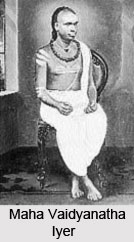 Maha Vaidyanatha Sivan was born in the year 1844. He is well-known for his compositions of Carnatic music. He was a great exponent of extemporaneous singing. He also composed a Ragamalika (garland of ragas - a song that utilises more than one raga) with all the 72 melakartha ragas.
Maha Vaidyanatha Sivan was born in the year 1844. He is well-known for his compositions of Carnatic music. He was a great exponent of extemporaneous singing. He also composed a Ragamalika (garland of ragas - a song that utilises more than one raga) with all the 72 melakartha ragas.
Early Life of Maha Vaidyanatha Sivan
Vaidyanatha Iyer was born in the village of Viyacheri in the Thanjavur districts of Tamil Nadu. His father Duraisami Iyer was also a musician and he trained Vaidyanatha Iyer as well as his other sons in Carnatic music. Vaidyanatha Iyer continued his training with some of the well known musicians of his time including Anai Ayya brothers. Later he continued his training under Manambuchavadi Venkatasubbayyar, one of disciple of Tyagaraja. He was famous for his elaboration of ragas (raga alapana). Maha Vaidyanatha Sivan and his elder brother, Ramaswami Sivan, were the earliest performing duo in the history of Carnatic music as known in the last two centuries.
He composed mainly in Telugu language and Tamil language and used the Mudra `Guhadasa`. Some of his famous compositions are Pahimam Srirajarajeswari (Janaranjani) and Neekela dayaradu (Sarasangi).
This article is a stub. You can enrich by adding more information to it. Send your Write Up to content@indianetzone.com




















